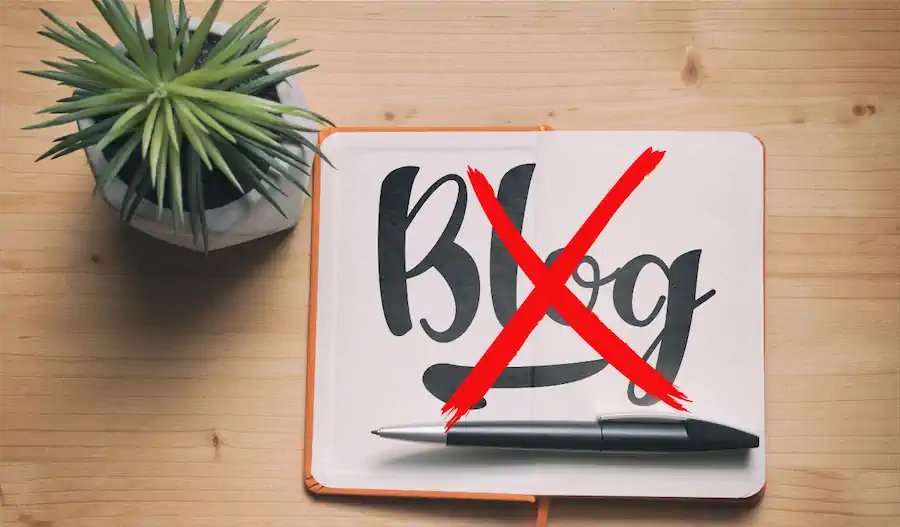Why is it so hard to sit down and write your blog posts?
[Disclosure: this post may contain affiliate links, this means I get a commission if you decide to make a purchase through my links. This is at no cost to you. Please read my disclosure information for more details.]
You said you were going to write at least three blog posts per week. You even scheduled it in a fancy calendar app and set alarms for it. Except, now it’s Thursday and you have not written one word and are dreading even starting.
Should you postpone it for next week? How will you deal with that sense of failure you are already feeling?
Reasons you might be resisting your writing
Writing can be stressful
Confronting a blank page can be difficult if not impossible to surpass. Will you have enough ideas to fill a 1k word article? Is your research solid? What about grammar? Does anything you write make sense at all.
All of these are questions that might go through your mind while facing that blank page. They keep you from taking the bull by the horns and just start writing.
Discipline is hard
Have you tried to follow a specific plan for a month or more? Have you been able to stick to the plan faithfully? Sometimes it’s possible, but soon comes a breaking point where you are no longer happy with doing the same thing at the “assigned time”. You want your freedom again and that means breaking that beautiful schedule you created and are following.
This is a normal reaction to having boundaries put in place. You see it in children and teenagers all the time.
You are be overwhelmed with tasks
This might seem like an excuse but you might be working full time and trying to build this side hustle in your free time. But life is complicated and noisy and we might be carrying all sorts of thoughts in our brains, creating chaos.
Not being able to concentrate works against your desire to write that new blog post, no matter how committed you are to making this side hustle work.

Self sabotage
The Psychology Today website defines self sabotage in this way. “Behavior is said to be self-sabotaging when it creates problems in daily life and interferes with long-standing goals.” It goes on to say that procrastination is one of the more common ways to sabotage yourself.
You made your blog part of your long term goals. But your actions (or non actions) are going against what you truly desire.
Not getting results
If you belong to any blogging groups you will always see a person saying, “I’ve been blogging for X and I’ve gotten no sales yet”. Some even complain when there’s only been two weeks since they started!
It’s important to go into blogging knowing it’s a long game. That 6 months is not enough, maybe even 12 months is not enough.
But we are putting content out there and want to be rewarded for the effort we put in. When nothing happens – no traffic, no clicks to our affiliate links – you get frustrated and no longer feel motivation to continue writing blog posts.
Not knowing whether the SEO is right
Everywhere you go you read that if you have done your SEO research properly, traffic should be knocking at your door. Maybe you don’t get SEO or it’s hard for you (it is for me) and you are not sure if you have done the right things to set up your blog posts for success.
This means you need to take time out of your already scarce free time to study about SEO and how to do it right. More frustration.
SEO courses aren’t cheap either. Neither are the tools you need to do your research like Ahrefs or SEMRush.
Is it no wonder a lot of bloggers quit soon after they have started.
Mike Futia has a FREE masterclass that helps you understand SEO.
The best skill to learn
Here is the thing. The biggest skill you can learn in this lifetime is how to control your emotions. We constantly bombard ourselves with negative self-talk and discouraging thoughts because we prefer the world we know (where we do nothing) than the world we could know (where we have a profitable blog).
Controlling your emotions does not mean you have to repress them. That only brings more trouble.
Here are some things that might help you:
- Be more self aware
What exactly are you feeling and what do you think triggered it? Try to identify the emotion. - Accept your emotions, both good and bad
- Be kind to yourself
Perhaps this week was not meant to be and you should take the rest of it off without feeling guilty about it. Forgive yourself for not being the superstar blogger that puts out a blog every day and then move on. - Keep a journal
This is incredibly helpful. Don’t over think it and just do some free writing in that journal. Write down everything that comes into your head even if you are jumping from one topic to the other. Just get all that noise out of your head and into paper. - Plan ahead
Do you see any obstacles that might get in the way of your writing next week? Some things are unexpected, like feeling down or low energy. But even then you can make a plan on what to do if you find yourself down in the dumps. Will you listen to some music to get yourself wired? Will you give yourself a prize once your blog post is written? - Do it anyway
I love being a writer, but sitting down and actually doing it is very challenging for me. In the end, if you want your blog to succeed, you need to write those blog posts. Either that or outsource it, but it will cost you.







